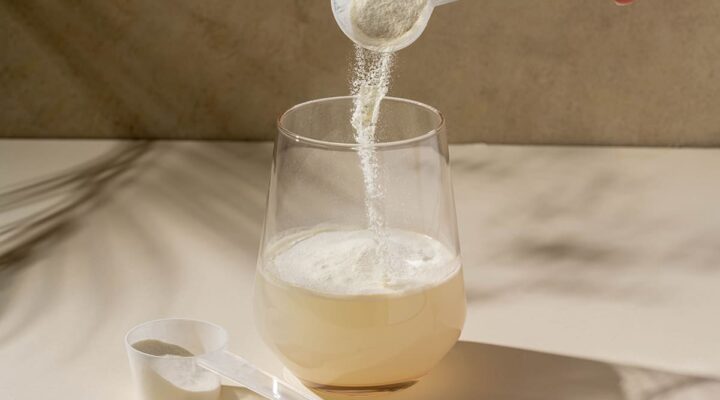How to Beat Protein-Related Bloating

Gas is a perfectly normal consequence of digestion. The average adult passes it between 13 and 21 times a day. For those of you sitting on the latter half of that spectrum, or indeed surpassing it (i.e. regularly experiencing bloating and discomfort), there could well be something to address in your diet.
Any number of dietary blind spots could be the cause of persistent bloating. And of course, it’s hard to ignore the fact that the issue is particularly prominent among those who regularly consume liquid meals and protein shakes. Needless to say, cheap whey protein supplements will do few favours for your gut, 1) because the number of us suffering from lactose intolerance is largely underestimated and 2) because they’re often packed with unseemly additives including sugar alcohols, inulin and other added fibres.
But gastrointestinal issues like bloating may not necessarily tied to the type of protein you consume, but how you consume it. The act of gulping down shakes, smoothies or meal replacements without chewing could well be at the roots of regular bloating. Chewing activates the first stage of digestion by activating digestive enzymes. It also prepares the gut by releasing gastric secretions and enzymes that help to break down what’s coming in. What you’re essentially doing when you chew (aside from breaking down food into swallowable chunks) is sending a signal that food is coming in, rather than water.
Which isn’t to say that you have to give up your shake or smoothie habit. Though meals made up of whole foods here and there is advisable, the simple act of chewing while consuming a smoothie releases the saliva enzymes which trigger better digestion. You might also try consuming them with a straw, as swallowing excess air while sipping has also been linked to bloating.
Got that covered? Here are some more top tips to beat the bloat:
- Eat slow. Avoid distractions such as your phone and Netflix while you eat because these will hinder proper chewing. When you don’t chew well, you don’t break down your food well enough and swallow large pieces that are difficult for the body to process.
- Listen to your body. If you suspect there’s a singular dietary culprit for your bloating, try to get to the bottom of it. Understand which foods work for you and which don’tExercise. Regular activity stimulates the lymphatic system, which among other things, regulates digestion.
- Make sure you’re getting enough fibre to counterbalance fat. Not having adequate fibre in your diet will mean you’re not able to move things through as smoothly. Fibre feeds the gut, and a healthy gut means healthy digestion.
- But don’t overdo it. Too much fibre when your body’s not used to it can be a shock to the system. When your body is used to a particular diet then you suddenly go on a health kick with plentiful fruits and veggies, your gut bacteria need time to adapt. One way to compensate for this is to drink more water. We need water to push things through our system, so make sure you’re getting enough.
- You might be dehydrated. When the body doesn’t have enough water, it attempts to counter-balance the effects by holding on to excess water, which could lead to bloating. If bloating is a daily persistence, you could try drinking a litre of warm water soon after waking and about 30 minutes before breakfast. For an extra boost, squeeze in half a lemon.
_
To ensure you get every ounce of goodness from Form’s Superblend Protein, we use an effective dose of BioPerine®, an extract from black pepper proven to increase bioavailability (absorption of nutrients), plus the whole spectrum of enzymes found in DigeZyme® to ease digestion.


















